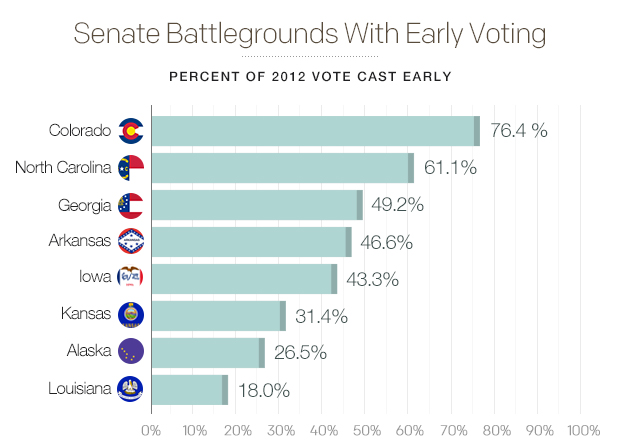Polling places continue to open for early voting across the country
With just 15 days until the 2014 midterm election, six states have officially opened polling places to voters who want to skip the lines on election day.
Early voting officially opened in Alaska, Arkansas, Colorado, Illinois, Texas and Wisconsin, as well as in Washington, D.C. Other states, including Florida, allow their election supervisors to open the polls today, but they're not required to open them.
Voters have been quick to seize on the opportunity to vote early. In recent midterm elections, and in 2010 about 25 percent of ballots were cast early, University of Florida political science professor Michael McDonald told CBS News. In 2014, that percentage should rise to 27 or 28 percent.
"It's more convenient to the voters," McDonald said. "We have states expanding the opportunities for people to vote early and when a state does expand and open up the door to more early voting, generally what we see follow is that the voters themselves will start taking advantage of that new method of voting."
- Full coverage: Campaign 2014
- Pot, abortion, minimum wage among hot-button issues on ballots in November
Both parties have made significant investments in early-voter mobilization, in part because of the increasing popularity of early voting, especially in the midterm elections. Senate Democrats, for example, launched the "Bannock Street Project" to help combat the usual downturn in voting that primarily occurs among minorities, single women and young people in midterm elections. Those groups were critical to President Obama's 2008 and 2012 regular election victories, so the Democratic Senatorial Campaign Committee (DSCC) devoted $60 million to help combat that trend in 10 different states where their senators face uphill re-election battles.
"What the election will really come down to is: Are Democrats able to use voter mobilization to reshape the electorate in their favor? There's some indications they may be able to do that but we still have two weeks to go in the election," McDonald said.
In general, voting by mail tends to benefit Republicans while Democrats do better in early voting, he said, though it's a generalization that doesn't always hold true. What does drive up turnout among both parties is a hotly contested race.
Alaska, Arkansas and Colorado all have close Senate races where Republican challengers are seeking to oust a Democratic incumbent. Illinois and Wisconsin both have an incumbent governor - Democrat Pat Quinn in Illinois and Republican Scott Walker in Wisconsin - fighting to keep his job.
A few states also have controversial ballot measures that may attract voters. Alaskans will be weighing in on legalizing marijuana and increasing the minimum wage. Illinois has a ballot measure to raise the minimum wage to $10 an hour for adults. And in Colorado, voters are considering an amendment that would expand the definition of "person" and "child in the state's criminal code to include the unborn.
McDonald warned that early voting numbers can't tell us much about how the election will end up. "They tend to confirm what we see with the polling numbers," he said.

